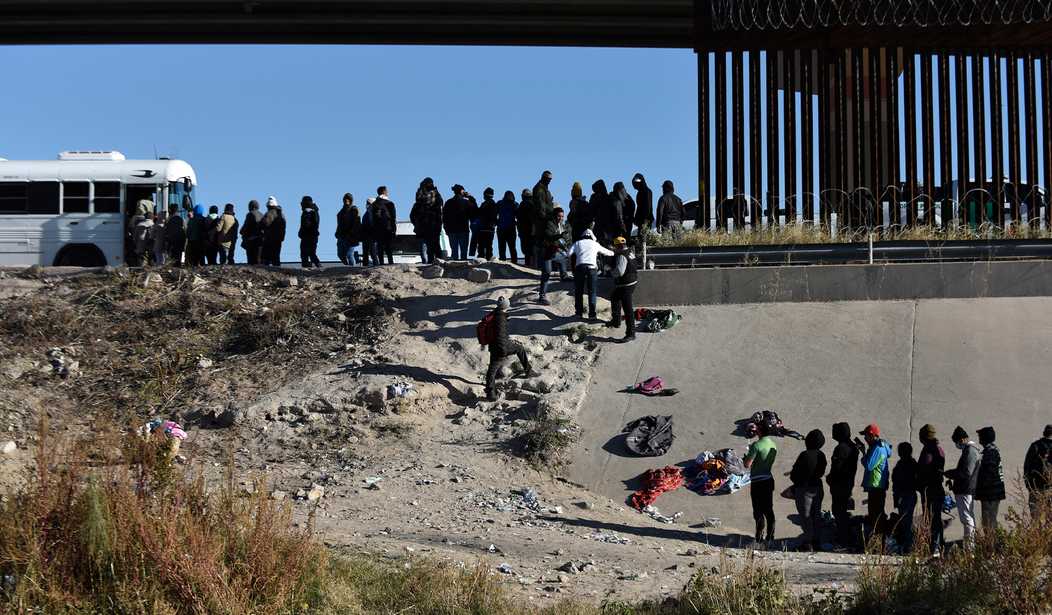People migrating has been the story of humanity. The latest genetic evidence shows modern humans arising in several different places in Africa at several different times. Changing climate, unfriendly neighbors, or a wanderlust that seems peculiar to the human race have all led to humans moving to other places from where they were born. But what's clear is that from the beginning, humans have felt the need or have been forced to migrate.
All this was happening 100,000 years ago. Now, there are nation-states. As much as many radical pro-migration advocates want to change that fact, people already living in countries with (mostly) defensible borders who speak a common language and practice the same or similar customs are resistant to migration. They like where they live and don't want to change.
More prosaically, most sane people don't want to import the troubles these people left behind in the first place.
America is different. We're an exceptional country because we've always been able to absorb the "wretched refuse of your teeming shores," pluck what was good and noble from these immigrants, and watch as they turned into Americans. The process of assimilation was not gentle. It wasn't until the second or third generation of an immigrant family's experience in America that they no longer saw themselves primarily as hyphenated Americans.
Immigrants have enriched the United States. But is there a limit to the number of immigrants the United States is able to accept without altering its fundamental character? The left and pro-migrant advocates never talk about this. Any mention of limits is "xenophobic" or racist.
They don't care about the United States' "fundamental character." In fact, they see that character as evil and want to change it. The same holds true in Europe where guilt-ridden elites have allowed millions of illegal migrants into their countries.
Europe has something of an excuse. Their birth rate is so low that it's fallen below population replacement, making the importation of warm bodies to do the scut work of society a national imperative.
But no one asked these mostly homogenized European citizens if they wanted the newcomers. To dismiss the idea that the people are somehow racist or xenophobic for not wanting to open their borders to all comers, recent statistics on the share of the population that is foreign-born since 1990 should open a few eyes.
Sweden shows 9% foreign-born residents in 1990. It was 20% in 2020, the last year statistics are available.
Germany had 8% foreign-born in 1990. It's 19% today. Spain went from 2% foreign-born in 1990 to 15% in 2020.
The Netherlands went from 8% to 14%, the UK from 6% to 14, and Italy from 3% to 14%. In the space of 20 years, Europe has become almost unrecognizable.
Now, finally, it appears that the majority of ordinary Europeans have had enough. Those who were not too cowed by the media calling them "fascists" for wanting to keep their national character voted strongly for anti-immigration parties in the recent elections for the European Parliament.
For years, mainstream Western politicians, from the center-right to the center-left to the left, have dismissed voters’ concerns about immigration. Some politicians describe it as a free lunch, with only economic benefits and no costs. They portray worries about immigration — worries shared by millions of people of different races, especially those with lower incomes — as inherently ignorant or xenophobic. Some politicians claim that governments are helpless to control their borders.
Many voters responded by drifting to the only parties that promised to reduce immigration — parties on the extreme right. To be clear, these parties do traffic in racism, as well as conspiracy theories, violent rhetoric and authoritarianism. To many voters, though, the parties were also the one part of the political system willing to listen to public opinion about rising immigration.
The elites, who control the media, the culture, the schools, and the national narrative, felt confident in their abilities to shame the native-born population by raising the specter of fascism and racism. It usually works quite well. But this time, enough voters resisted the propaganda and voted for change.
Andrew Sullivan, the political journalist (and an immigrant to the U.S.), points out that the disconnect has been particularly stark over the past few years. “As the public tried to express a desire to slow down the pace of demographic change, elites in London, Ottawa and Washington chose to massively accelerate it,” Sullivan wrote on Substack. “It’s as if they saw the rise in the popularity of the far right and said to themselves: Well now, how can we really get it to take off?”
There were at least 10.5 million people from foreign lands living in the United States illegally in 2021. They get by because of a tolerant government and a screwed-up immigration enforcement system. Now what? There have been at least 5 million illegal aliens entering the United States since Joe Biden was sworn in. And millions more are on the way.
Related: Backbone of a Jellyfish: Biden Looks to Placate the Left by Granting Amnesty to a Million Illegals
The U.S. can absorb a lot of newcomers. But 5 million people who are poorly or uneducated, not English speakers, and hundreds of thousands of single mothers with children who will need to be fed, housed, clothed, and educated in the next 20 years is a problem no government, either Democratic or Republican, is remotely capable of handling.
To Biden and the rest of the open borders crowd: Shouldn't we have thought of that beforehand?










